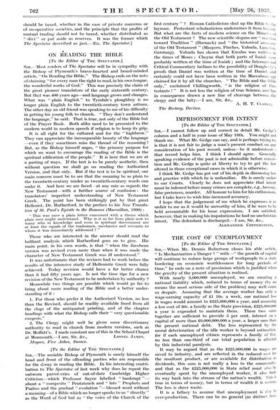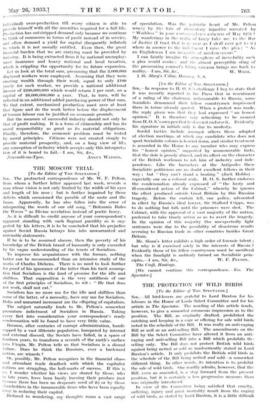THE COST OF UNEMPLOYMENT
[To the Editor of THE SPECTATOR.] SIR,—When Mr. Dennis Robertson closes his able article, " Is Mechanization a Danger ? " with—" the growth of capital will continue to reduce large groups of workpeople to a state bordering on economic worthlessness for long periods of time," he ends on a note of pessimism which is justified when the gravity of the present situation is realized. With nearly 3,000,000 unemployed, we are creating a national liability which, reduced to terms of money (by no means the most serious side of the problem) may well cause us despair. Assuming that the average worker has only a wage-earning capacity of £1 10s. a week, our national loss in wages would amount to £225,000,000 a year, and assuming a low cost of 30s. a family as the State provision, £225,000,000 a year is expended to maintain .them. These two sums together are sufficient to provide 5 per cent. interest on a capital of more than £9,000,000,000 a year, a larger sum than the present national debt. The loss represented by the moral deterioration of the idle worker is beyond estimation, for if each unemployed citizen represents a family of five, no less than one-third of our total population is affected
by this industrial paralysis. ,
It may be argued that as the £225,000,000 in wages are saved to industry, and are reflected in the reduced cost for the resultant product, or are available for distribution as dividends, this sum is not really a loss to the community, and that as the £225,000,000 in State relief must also be eventually spent by the unemployed worker,' it also finds its•way back into the stream of the nation's wealth. This is true in terms of money, but in terms of wealth it is untrue. The loss is sheer waste.
It is a fallacy to assume that unemployment is due to over-production. There can be no general (as diitinct from
individual). over-production till every citizen is able to Provide himself with all the amenities required for a full life. Production has outstripped demand only because we continue to think of commerce in terms of profit instead of in service, and often demand a yield for capital (frequently inflated) to which it is not morally entitled. Even then, the great financial burden that we are carrying must be provided by industry. It is being extracted from it by national unemploy- ment insurance and heavy national and local taxation, which is crippling the opportunity for its future expansion.
Let us look at the total sum, presuming that the 3,000,000 displaced workers were employed. Assuming that they were creating wealth through their work, equal to only £100 yearly for each worker, we provide a national additional income of 1300,000,000 which would return 5 per cent. on a capital of £6,000,000,000 a year. That, in turn, will be reflected in an additional added purchasing power of that sum. '10 that extent, mechanized production must save at least that figure and do the work better before the displacement of human labour can be justified on economic grounds.
But the measure of successful industry should not only be that of profit making. It is a form of citizenship and has its moral responsibility as great as its material obligations. Finally, therefore, the economic problem must be tested by moral principles. Citizens were not created simply to provide material prosperity, and, on a long view of life, any conception of industry which accepts only this interpreta- tion of it is bound to fail.—I am, Sir, &c.,

















































 Previous page
Previous page